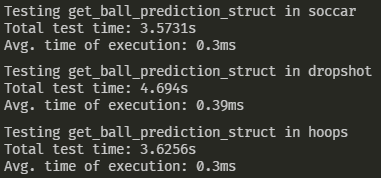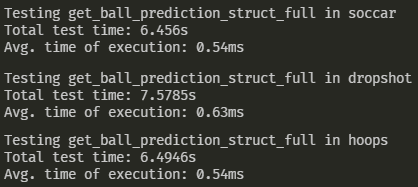RLBot Python bindings for rl_ball_sym 0.2
RLBot Python bindings for the Rust crate rl_ball_sym.
Prerequisites:
- Rust & Cargo
- RLBot - Verify that the file
%localappdata%\RLBotGUIX\Python37\python.exeexists. If it doesn't, please re-download and re-install from the website to update.
Steps to build the Python bindings
- Download this repository
- Run
cargo_build_release.bat - A new file, called
rl_ball_sym.pyd, will appear - Copy
rl_ball_sym.pydto your Python project's source folder import rl_ball_symin your Python file
Basic usage in an RLBot script to render the path prediction
See script.cfg and script.py for a pre-made script that renders the framework's ball path prediction in green and the rl_ball_sym's ball path prediction in red.
from traceback import print_exc
from rlbot.agents.base_script import BaseScript
from rlbot.utils.structures.game_data_struct import GameTickPacket
import rl_ball_sym as rlbs
class rl_ball_sym(BaseScript):
def __init__(self):
super().__init__("rl_ball_sym")
def main(self):
rlbs.load_soccar()
while 1:
try:
self.packet: GameTickPacket = self.wait_game_tick_packet()
current_location = self.packet.game_ball.physics.location
current_velocity = self.packet.game_ball.physics.velocity
current_angular_velocity = self.packet.game_ball.physics.angular_velocity
rlbs.set_ball({
"time": self.packet.game_info.seconds_elapsed,
"location": [current_location.x, current_location.y, current_location.z],
"velocity": [current_velocity.x, current_velocity.y, current_velocity.z],
"angular_velocity": [current_angular_velocity.x, current_angular_velocity.y, current_angular_velocity.z],
})
path_prediction = rlbs.get_ball_prediction_struct()
self.renderer.begin_rendering()
self.renderer.draw_polyline_3d(tuple((path_prediction["slices"][i]["location"][0], path_prediction["slices"][i]["location"][1], path_prediction["slices"][i]["location"][2]) for i in range(0, path_prediction["num_slices"], 4)), self.renderer.red())
self.renderer.end_rendering()
except Exception:
print_exc()
if __name__ == "__main__":
rl_ball_sym = rl_ball_sym()
rl_ball_sym.main()
Example ball prediction struct
Normal
[
{
"time": 0.008333,
"location": [
-2283.9,
1683.8,
323.4,
],
"velocity": [
1273.4,
-39.7,
757.6,
]
},
{
"time": 0.025,
"location": [
-2262.6,
1683.1,
335.9,
],
"velocity": [
1272.7,
-39.7,
746.4,
]
}
...
]
Full
[
{
"time": 0.008333,
"location": [
-2283.9,
1683.8,
323.4,
],
"velocity": [
1273.4,
-39.7,
757.6,
]
"angular_velocity": [
2.3,
-0.8,
3.8,
}
},
{
"time": 0.016666,
"location": [
-2273.3,
1683.4,
329.7,
],
"velocity": [
1273.1,
-39.7,
752.0,
],
"angular_velocity": [
2.3,
-0.8,
3.8
]
}
...
]
doc
Returns the string rl_ball_sym is a Rust implementation of ball path prediction for Rocket League; Inspired by Samuel (Chip) P. Mish's C++ utils called RLUtilities
load_soccar
Loads in the field for a standard soccar game.
load_dropshot
Loads in the field for a standard dropshot game.
load_hoops
Loads in the field for a standard hoops game.
set_ball
Sets information related to the ball. Accepts a Python dictionary. You don't have to set everything - you can exclude keys at will.
time
The seconds that the game has elapsed for.
location
The ball's location, in an array in the format [x, y, z].
velocity
The ball's velocity, in an array in the format [x, y, z].
angular_velocity
The ball's angular velocity, in an array in the format [x, y, z].
radius
The ball's radius.
Defaults:
- Soccar - 91.25
- Dropshot - 100.45
- Hoops - 91.25
collision_radius
The ball's collision radius.
Defaults:
- Soccar - 93.15
- Dropshot - 103.6
- Hoops - 93.15
set_gravity
Sets information about game's gravity.
Accepts an array in the format [x, y, z].
step_ball
Steps the ball by 1/120 seconds into the future every time it's called.
For convience, also returns the new information about the ball.
Example:
{
"time": 0.008333,
"location": [
-2283.9,
1683.8,
323.4,
],
"velocity": [
1273.4,
-39.7,
757.6,
]
"angular_velocity": [
2.3,
-0.8,
3.8,
}
}
get_ball_prediction_struct
Equivalent to calling step_ball() 720 times (6 seconds).
Returns a normal-type ball prediction struct.

get_ball_prediction_struct_full
Equivalent to calling step_ball() 720 times (6 seconds).
Returns a full-type ball prediction struct.

get_ball_prediction_struct_for_time
Equivalent to calling step_ball() 120 * time times.
Returns a normal-type ball prediction struct.
time
The seconds into the future that the ball path prediction should be generated.
get_ball_prediction_struct_full_for_time
Equivalent to calling step_ball() 120 * time times.
Returns a full-type ball prediction struct.
time
The seconds into the future that the ball path prediction should be generated.





